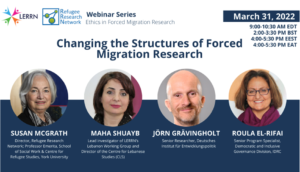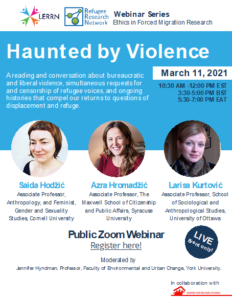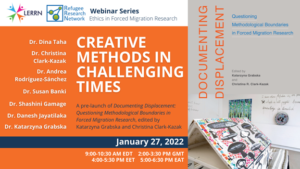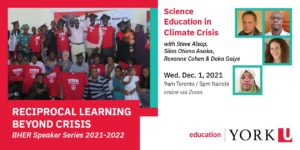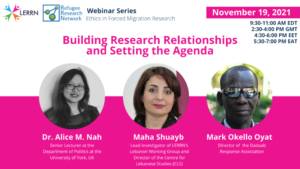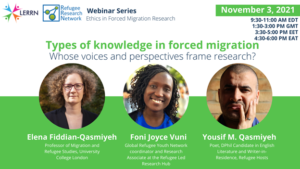The RRN Research Digest provides a synopsis of recent research on refugee and forced migration issues from entities associated with the RRN and others.
You can download the digest in PDF format here: RRN Research Digest No. 121
LERRN-RRN Webinar: Changing the Structures of Forced Migration Research, March 31, 2022. The final webinar of the series plans to engage with how research and research funding structures may be changed. While some changes can be brought-about by individual researchers, we recognize that some of the challenges are deeper and more structural, like unequal access to research funding. Some donors are piloting innovative initiatives, like the Canadian International Development Research Centre establishing research chairs on forced displacement with direct funding to scholars in various regions of the global South to pursue their independent research agendas. What is the role of donors in addressing the issues raised in this series? What would it take to get more donors on board with initiatives like direct funding to local researchers? What structures need to change, and what is the path forward? For more information and to register here.
NEW RESEARCH AND PUBLICATIONS
Murrani, S., Lloyd, H., & Popovici, L.C. (2022) Mapping home, memory and spatial recovery in forced displacement, Social & Cultural Geography. This article presents empirical findings of a multimodal participatory mapping project conducted with refugees and asylum seekers in Southwest England. It highlights the impact of memory and deep creative mapping on the spatial practice of making-home in forced displacement. The resulting maps embody spaces of recovery; memory scapes reveal synergies between memory constructs and the concept of home in exile. The project asks how a creative participatory method of mapping home through memory reconsolidation can ameliorate the trauma of displacement and aid the re-making of home.
Kerwin, D., Pacas, J., & Warren, R. (2022). Ready to Stay: A Comprehensive Analysis of the US Foreign-Born Populations Eligible for Special Legal Status Programs and for Legalization Under Pending Bills Journal on Migration and Human Security, 10(1), 37–76. This paper offers estimates of US foreign-born populations that are eligible for special legal status programs and those that would be eligible for permanent residence (legalization) under pending bills. It seeks to provide policymakers, government agencies, community-based organizations, researchers, and others with a unique tool to assess the potential impact, implement, and analyze the success of these programs. It views timely, comprehensive data on targeted immigrant populations as an essential pillar of legalization preparedness, implementation, and evaluation.
Rashi, T. (2022). Jewish Ethics Regarding Refugees: Ideology and Realization. Journal of Law and Religion, 37(1), 153-166. This article addresses the Jewish ethical approach to refugees. According to Jewish ethics, help must be offered to refugees of a foreign people, and sometimes, for the sake of peace, even to those of an enemy state. The author reflects on breaking barriers of hatred and concludes that priority must be given to refugees in acute distress and who are near the border.
Wallace, R. (2022). New Reasons for Forced Displacement: A Multimodal Discourse Analysis of the Construction of Refugee Identity. Journalism Practice, 16(2-3), 244–261. New narratives of forced displacement and complex refugee identities are often excluded from mediated communications about important issues. By focusing on the discourse of two distinct objects of analysis, that of nongovernmental organizations and transnational journalism projects across Latin America, this study sought to better understand how news media and essential advocates for refugees are framing narratives of forced displacement throughout the region. These findings suggest that complex refugee identities are symbolically annihilated in the construction of news narratives. New reasons for forced displacement are primarily ignored, relying more heavily on homogenous representations and existing frames for Latinx refugees, accounting for greater diversity in representations of foreign refugees.
REPORTS AND POLICY BRIEFS
Report: Crisis in Ukraine: Humanitarian and Human Rights Imperatives by Daphne Panayotatos, Irla Atanda, & Eric Schwartz, Refugees International. March 21, 2022. This report is the result of a Refugees International research trip conducted in Poland between March 2 and March 9, documenting a crisis that has resulted in the forced displacement within and outside Ukraine of nearly a quarter of the Ukrainian population, and humanitarian suffering of many millions more. While the speed of the response outside Ukraine has been unprecedented and generous, Refugees International calls for additional EU and international support for Poland and other refugee-receiving countries bordering Ukraine. Additionally, urging for measures to ensure that non-Ukrainians seeking to flee Ukraine are treated with the same fairness and humanity being accorded to Ukrainians.
Report: From adaptability to vulnerability: Changes in admission criteria and refugee participation in social assistance by Lisa Kaida, Max Stick and Feng Hou, Statistics Canada. The 2002 Immigration Refugee Protection Act (IRPA) replaced the Immigration Act, 1976 as the primary legislation guiding immigration in Canada. This report summarizes results from a recent study that compared the long-term use of social assistance among resettled refugees arriving under pre-IRPA guidelines (1997 to 2001), during the transition period (2002 to 2004), and post-IRPA (2005 to 2009). The authors used the Longitudinal immigration database to determine whether resettled refugees arriving after the introduction of IRPA were more likely to rely on social assistance than earlier cohorts.
NEWS AND BLOG POSTS
UNHCR Press Briefing: A month since the start of the war, almost a quarter of Ukraine’s population are displaced, UNHCR. March 25, 2022. Summary of the current humanitarian crisis in Ukraine, outlining the devastating and far-reaching effects of war. Individuals, families and communities will need protection, shelter, assistance and access to basic services like health, education and social protection for years, if not decades. However, the most effective form of humanitarian relief would be a halt to this war.
Family separations in Ukraine highlight the importance of children’s rights by Christina Clark-Kazak, The Conversation. March 20, 2022. Given the conscription of men aged 18 to 60 in Ukraine, most Ukrainians fleeing into neighbouring countries are women and children. Adults making decisions on behalf of separated children and those in care should look to the lessons of the past when focusing on the best interests of children.
Australia should grant temporary visas for all jobs earning over $70,000 by Paul Karp, The Guardian. March 17, 2022. The report argues that workers on the temporary skilled visa are particularly vulnerable to exploitation because the visa is tied to their sponsoring employer, and they must leave Australia within 60 days if they stop working for them.The Grattan Institute called for a crackdown on bad-faith employers who mistreat their workers, with the home affairs department to conduct more random audits.
Can Ukraine Change Australia’s Attitude Toward Refugees? By Grant Wyeth, The Diplomat. March 17, 2022. There is a notable shift in public sentiment toward refugees in Australia in response to the Ukraine crisis. While it might be easy to be cynical about the different responses to European refugees compared to refugees from other regions of the world, the goal instead should be to use this moment to reframe public perceptions toward refugees more broadly, and allow greater empathy to develop for those fleeing other conflict zones too.
Humanitarian protection and durable solutions by Kristin Bergtora Sandvik and Adèle Garnier, Refugee Law Initiative. March 4, 2022. This blog aims to contribute to understanding the evolving displacement context and the implications for the international protection regime and durable solutions, providing a set of initial reflections. Specifically, paying particular attention to contemporary refugee politics, the authors produce a list of initial issues concerning vulnerability, prioritization, and pathways to support advocacy on behalf of Ukraine.
EVENTS, DIGITAL AND SOCIAL MEDIA
Podcast: The Conversation Weekly (March 10, 2022) The trauma of life in limbo for refugees and asylum seekers in immigration detention. In this week’s episode, two experts on immigration detention in Australia and the UK discuss why people are waiting months, sometimes years, for a decision about their future – and the impact it is having on their lives.
Summer Course: Centre for Refugee Studies, June 6-10. The course provides an interdisciplinary, interactive and experiential approach to the study of forced migration. Through attending lectures and related small group sessions, course participants develop a deepened understanding of the political, economic, social and cultural contexts of forced migration, and the major state and non-state institutions involved in refugee protection and advocacy. In addition, participants will have an opportunity during the course for structured networking and idea collaboration through panels and small group discussions. For more information and to apply click here.

